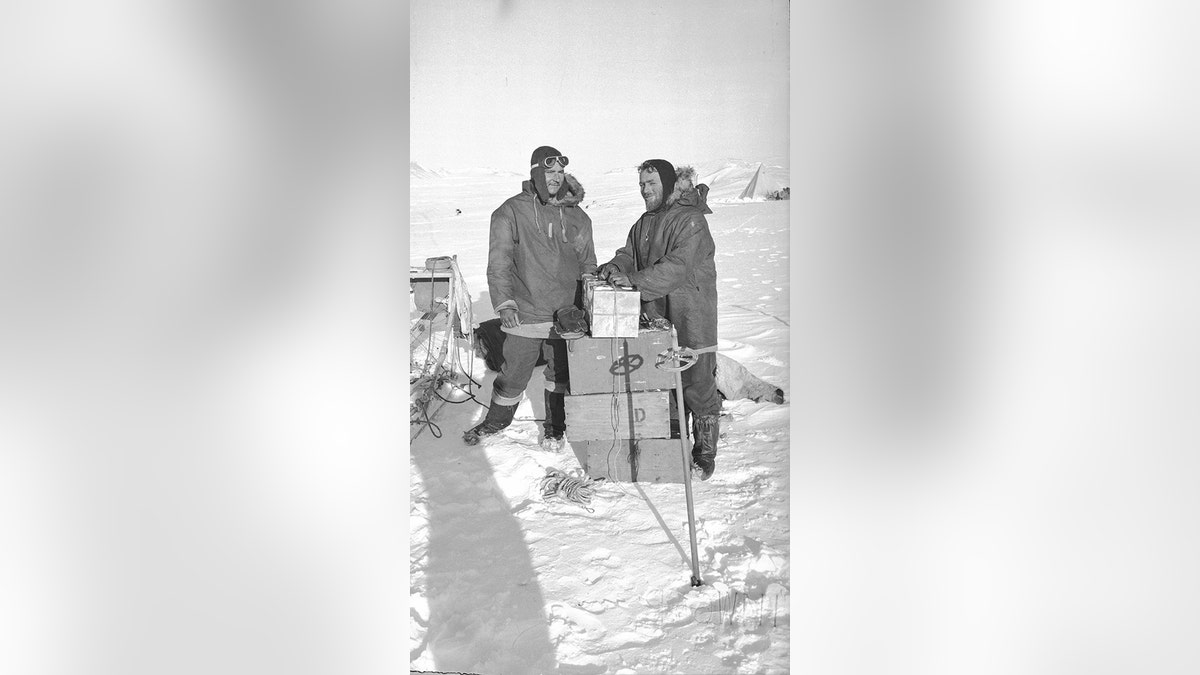
The end of the first sledge journey from Hope Bay: Victor Russell and David James. Launched in 1943, Operation Tabarin was an expedition to secretly establish bases, keep a watchful eye on German and Japanese activities, and curb opportunistic Argentinian incursions. (Credit: Natural Environment Research Council)
The stunning true story of how a British expedition to the Antarctic helped defeat the Nazis has been revealed for the first time in a new book.
Launched at the 1943 height of World War Two, Operation Tabarin was said to be a top-secret project to establish military bases and watch German and Japanese activities in the freezing South Pole.
But the expedition also helped protect vital allied shipping in the South Atlantic - and crucially helped stamp out Argentina's efforts to reclaim the Falklands.
German cruisers had already been terrorizing Norwegian whalers off the coast of Antarctica - with one boat seizing 20,320 tonnes of valuable whale oil from the allied war effort.
The incident led to HMS Queen of Bermuda patrolling the area between South Georgia, the South Shetland Islands and Weddell Sea - and the expedition soon followed.
Lead botanist Ian MacKenzie Lamb was a member of the initial crew - and stayed on until the end of the war.
Lamb’s account is told in a new book, The Secret South, compiled from his memoirs and edited by Stephen Haddelsey and Ronald Lewis-Smith.
The editors of the book wrote: "Whatever quixotic objectives motivated him to join the expedition, there can be absolutely no doubt regarding Lamb’s contribution to the success of Operation Tabarin.

Base ‘A’ from the east, showing the Nissen hut. (Credit: Natural Environment Research Council)
“As well as helping to establish its three manned bases – on Deception Island and on Goudier Island early in 1944, and at Hope Bay in February 1945 – he took part in all of the major sledging journeys, manhauling across Wiencke Island in September and October 1944, and covering some 800 miles with dog teams in the area around James Ross Island between August and December 1945.
“A highly proficient photographer, he also took countless photographs, both at the bases and while sledging, and developed the negatives and printed the images in the base’s tiny darkroom.
“In some ways, though, perhaps the most important of Lamb’s characteristics, at least when judged against the peculiar backdrop of a polar expedition, were his empathy and kindliness.”
After the war, Britain continued the operation of the bases built during Operation Tabarin, by transferring them to the newly established Falkland Islands Dependencies Survey.
Operation Tabarin veterans Reece, White and Rusell remained at their bases, continuing their work for the FIDS. Participants of Operation Tabarin were awarded the Polar Medal in 1953.
This story originally appeared in The Sun.
